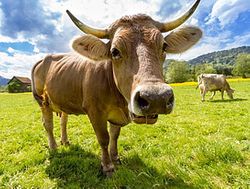
Many people have wondered at some point or another: Do I go dairy free? The answer is simple. If dairy makes you feel happy and you’re in the pink of health, then go ahead and continue to drink it. But if you have eczema, asthma or other allergy-related or immune response issues, then it’s in your best interest to cut out dairy from your diet. This article explores the benefits of cutting out dairy for eczema sufferers, and also lists dairy free substitutes that you can use. So get ready to ditch the dairy, and reclaim your health!
The good and the bad
My parents brought me up being informed (by commercials, doctors and such) that cow’s milk is superior to human milk, as it has more of everything: calcium, protein, and lots of vitamins, minerals and nutrients. That’s why the cow grows up so big and strong! So if you want your child to be as strong as a bull, just feed them cow’s milk!
These days, with more research being done and published on dairy, more and more controversies surround the issue of whether dairy is as beneficial to us as what the media and some would have us believe.
Having read up on a number of articles and research papers, my personal take on this is: there certainly are valuable nutrients, minerals, protein and calcium in dairy. Along with these, there are also animal hormones, antibiotics and other drugs and contaminants, and some fat and cholesterol.
It seems like the question of whether humans are able to digest and assimilate the good stuff meant for a calf remains an area for further research. How much good stuff (and bad, for that matter) goes into the milk also depends on what the cow eats and drinks, its lifestyle, etc. Generally grass-fed cows that are free to roam in the pastures produce better-quality milk.
An extensive 12-year Harvard study of 78,000 women found no evidence that high dairy product consumption reduced fracture incidences, or gave any protection against hip and forearm fractures.
At the end of the day, if you have no health issues and dairy is one of your favourite foods, by all means enjoy it and reap the benefits it has been providing you. But if your health has been suffering for a while or just started deteriorating and you can’t seem to identify the cause, or if you have eczema, asthma or other allergy and immune related issues, do read on to find out why you should eliminate dairy from your diet.
Why dairy is bad for some people
Three quarters of the world is intolerant to lactose, as they lack the ability to produce a digestive enzyme, called lactase, that breaks down the lactose in dairy. Many of these cases go undiagnosed, as the symptoms are usually rather mild. Signs of lactose intolerance can range from diarrhea, abdominal pain, and bloatedness to nausea and vomiting. Sometimes you don’t get any of these signs, but your body just isn’t happy with the milk that you just drank, so you may feel a bit moody but never made the link with dairy.
For people with eczema and asthma, the immune system is sensitive, and tends to react to allergens easily. Dairy is not a natural food for us, as it is meant for calves. The animal hormones may seem like foreign invaders to the human body, so the immune system attacks them, causing the skin or the airways to become inflamed.
Even for people who do not get any reaction from taking dairy, many of them find that after removing it from their diet, their eczema or respiratory-related symptoms like wheezing seem to make an improvement.
Dairy is found in many foods, so if you have decided to go dairy free, these are some foods that you definitely must avoid: ice cream, cheese, butter, cream, yogurt, pudding, custard, creamer, mayonnaise, chocolate, some baked goods, and many processed foods (please read the ingredients list).
Dairy free substitutes (click here to see the best brands we recommend in another post)
After learning about how dairy could possibly trigger eczema flares or worsen eczema symptoms, I tried cutting milk from my daughter’s diet when she was one and a half years old. Within a week, her eczema flares calmed down substantially. That was enough to help me decide to remove dairy from her diet completely. Now she is three and a half, and still loving her rice milk.
Rice Milk
Rice milk is the least likely to trigger allergies, and I know my daughter will be fine on it, since rice is already in our regular diet. Rice milk is made by milling the rice and blending it with water. It is commonly unsweetened, as during the milling and blending process, carbohydrates break down into sugar, so there is already a natural mild sweetness found in rice milk.
–> Check out our favourite rice milk brand here <–

The down side of rice milk is that it cannot replace the protein found in cow’s milk. So to make up for that, we make sure we get lots of greens that are high in protein, like spinach, broccoli, and sprouts.
Soy Milk
Soy milk is a protein-rich alternative to cow’s milk, but it lacks calcium. Soy is very rich in vitamin B and folic acid, but it has its own controversies surrounding it. Due to its high isoflavones which are estrogen-like compounds, it has been linked to cancer. But I believe it takes regularly high consumption to have any adverse effects. The other down side about soy is many soy products are GMOs (genetically modified organisms). It is also one of the main allergens for some people (including my daughter, who ends up itching very badly when we gave her soy milk).
–> Check out our favourite soy milk brand here <–
Almond Milk

Almond milk contains very low calories, and has a very fragrant nutty taste. It has very high vitamins D and E, but you still do need to supplement your intake of protein through greens and other foods. There are some people who are highly allergic to nuts. Although almond is really not a nut, in fact it is a seed, but I really don’t care about the technical jargon, especially if you have a known nut allergy, then you have to assess the risks involved.
–> Check out our favourite almond milk brand here <–
Oat Milk
Oat milk is tasty and nutritious. It is high in vitamin B, and is low on the allergen list. One thing to note, however, is that if you are on a gluten free diet, then you have to look for gluten free choices of oat milk. Oats are naturally gluten free, but when being processed, it frequently shares the same machinery as other grains that contain gluten. It doesn’t contain any calcium, and is low in protein, so do consciously take other foods that will boost your calcium and protein intake.
–> Check out our favourite oat milk brand here <–
Coconut milk
Coconut milk has a creamy texture and sweet taste, and is very fragrant. It is high in calories and fat, but these are healthy fats, so do not worry too much about it. Coconut milk can fortify your hair and skin, through its high nutritional content. It is also known to combat many diseases, from heart disease to immune system disorders.
–> Check out our favourite coconut milk brand here <–
Click on this other article to see our recommended brands of dairy free alternatives, they are totally free of additives like flavourings, emulsifiers and thickeners.
Dairy free lifestyle
Once you get the hang of it, it becomes quite effortless to live a dairy free lifestyle. We use rice milk in our banana nice cream, and coconut milk in our avocado sauces and dips. Even when my older children (9 and 10 years old) have a craving for some milk, they will simply reach into the fridge for that packet of rice milk, and drink heartily from it.
We are free of most processed foods, only have the occasional baked good from the bakery, so our kids are mostly dairy free. The two eczema warriors are on a much stricter gluten free diet, so it’s all natural and wholesome foods for them, no eggs, no dairy too. Their only snacks that are bought off the shelf are still minimally processed, and are also gluten free, egg free, and dairy free.
Moooooove the cows out of the way
We are doing it, so it is very doable and actually not that difficult to go dairy free. You will find that your mind thinks clearer, the brain fog is gone, your energy level is up, and generally your health will improve.
So do give it a go, and let us know how it has worked for you, through the comments below!

Being lactose intolerant myself, I am glad to see the alternatives are that are so readily available. I struggled for years to find an alternate source, but was not aware of the relationship of dairy with eczema. So many people suffer needlessly when a simple of their diet can make such a difference. Good work!
Hi Brad,
Yes, you’re so right that making a simple change like eliminating dairy from diet can improve some people’s eczema condition tremendously. I wish more eczema warriors would give this a try.
Thank you so much for this in formation, my 5yr old niece has it pretty bad. I will definitely try out one of your suggestions and hope it will helps her.
Hi Traci,
Yes, do let your niece try removing dairy from her diet, to see if it can improve her condition. All the best!
Very interesting! I never knew cow’s milk is not suitable for three quarters of the world. I am one of the lucky ones who can drink cow’s milk and not have any problems. But then again, I do not go all out to drink cow’s milk. I much prefer water and juice. I do consume milk products like chocolate and ice cream. And I can’t imagine not having either! haha
Good to know all the cow’s milk alternative. And coconut milk looks like something I would love to enjoy. Plus you say it is good for skin and hair as well as many health benefits. I’m in!
Thanks for a very useful article. I learned so much, and am more aware of cow’s milk.
Hi Timotheus,
I’m glad you found this article useful. I myself love dairy products like chocolate and ice cream too, they complete my life… oops. But for the sake of my eczema kids, I can only secretly eat them after they are in bed.
And yes, dairy free alternatives are packed with their own set of nutritional goodness, do give coconut milk a try if it appeals to you!
So glad to read about the alternatives to cow’s milk. My nephew is allergic to cow’s milk and he’s been given advice that it should be replaced with the rice milk, but sadly, he doesn’t like the taste of it. I have completely forgotten about almond milk! Thanks for reminding me, I shall be on the phone with my nephew right now to suggest he tries that!
Best,
Alenka
Hi Alenka,
I’m thrilled that this could help your nephew. I hope he finds a dairy free milk that suits his taste buds.